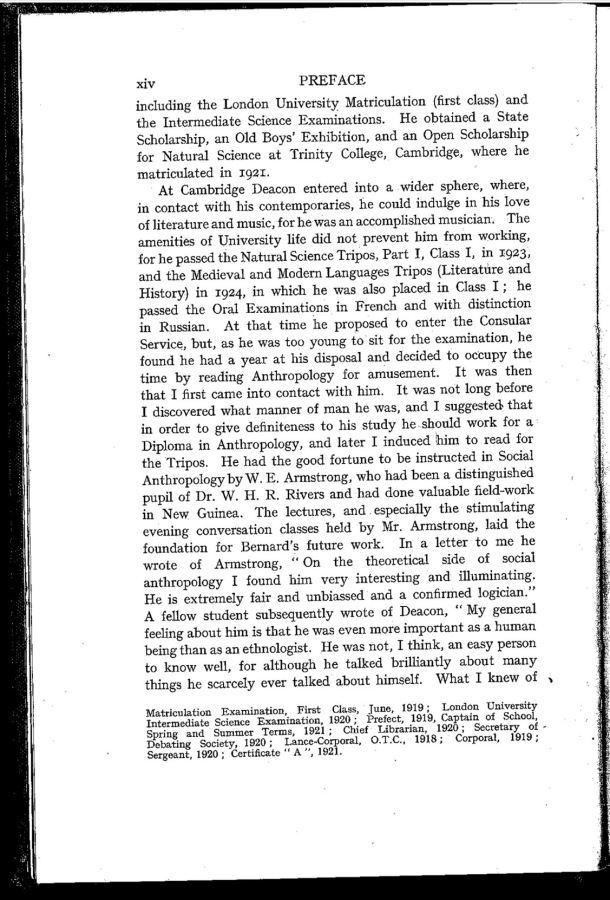|
|  [Note: this transcription was produced by an automatic OCR ENGINE]
xiv PREFACE
including the London University Matriculation (ï¬Årst class) and
the Intermediate Science Examinations. He obtained a State
Scholarship, an Old Boys’ Exhibition, and an Open Scholarship
for Natural Science at Trinity College, Cambridge, where he
matriculated in I921.
At Cambridge Deacon entered into a wider sphere, where,
in contact with his contemporaries, he could indulge in his love
ot literature and music, for he was an accomplished musician. The
amenities of University lite did not prevent him from working,
for he passed the Natural Science Tripos, Part I, Class I, in I923,
and the Medieval and Modern Languages Tripos (Literature and
History) in I924, in which he was also placed in Class I; he
passed the Oral Examinations in French and with distinction
in Russian. At that time he proposed to enter the Consular
Service, but, as he was too young to sit for the examination, he
found he had a year at his disposal and decided to occupy the
time by reading Anthropology for amusement. It was then
that I ï¬Årst came into contact with him. It was not long before
I discovered what manner of man he was, and I suggested that
in order to give deï¬Åniteness to his study heshould work for a
Diploma in Anthropology, and later I induced =hirn to read for
the Tripos. I-Ie had the good fortune to be instructed in Social
Anthropology byW. E. Armstrong, who had been a distinguished
pupil of Dr. W. H. R. Rivers and had done valuable field-work
in New Guinea. The lectures, and especially the stimulating
evening conversation classes held by Mr. Armstrong, laid the
foundation for Bernard's future work. In a letter to me he
wrote of Armstrong, “ On the theoretical side of social
anthropology I found him very interesting and illuminating.
He is extremely fair and unbiassed and a conï¬Årmed logician.â€ù
A fellow student subsequently wrote of Deacon, “My general
feeling about him is that he was even more important as a human
being than as an ethnologist. He was not, I think, an easy person
to know well, for although he talked brilliantly about many
things he scarcely ever talked about himself. What I knew of
Matriculation Examination, First Class, ]une, 1919; London University
Intermediate Science Examination, 1920; Prefect, 1919, Captain oi School,
Spring and Summer Tenns, 1921; Chief Librarian, 1920; Secretary of
Debating Society, 1920; Lance-Corporal, o.'r.c., 1918; Corporal, iaie;
Sergeant, 1920; Certiï¬Åcate " A 1921.
|